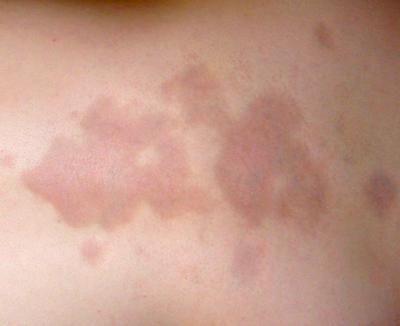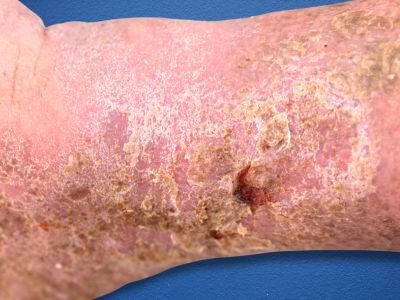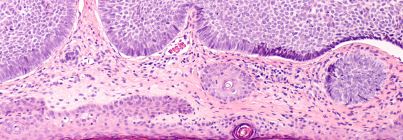Rheumatology-Dermatology
Comprehensive Care for Autoimmune Skin Diseases
Autoimmune diseases are complex conditions that affect skin, joints and organs. People living with autoimmune diseases often need care from multiple specialists.
At UC Davis Health, we bring together autoimmune disease and skin care experts in one convenient clinic. Our Rheumatology-Dermatology Clinic is the only one of its kind in the Sacramento region.
Autoimmune Skin Diseases
 Autoimmune diseases occur when the immune system attacks healthy cells. There are more than 100 different kinds of autoimmune diseases. Many of these diseases affect the skin, which is a condition known as autoimmune skin disease. Some autoimmune diseases are inherited, but many occur for no known reason.
Autoimmune diseases occur when the immune system attacks healthy cells. There are more than 100 different kinds of autoimmune diseases. Many of these diseases affect the skin, which is a condition known as autoimmune skin disease. Some autoimmune diseases are inherited, but many occur for no known reason.
Autoimmune skin diseases can cause:
- Blisters
- Itchy skin
- Lesions
- Rashes
- Scaly patches of skin
- Systemic illness
- Thickened skin
- Ulcers (open sores)
Choosing UC Davis Health for Autoimmune Skin Disease Care
If you have an autoimmune disease that affects the skin, you need to see medical experts who can treat both the disease and its related skin problems. Our board-certified dermatologists work together to address all your health care needs. Here’s what sets us apart:
Exclusive Expertise
You benefit from the expertise of board-certified dermatologists Samuel Hwang, M.D., Ph.D., and Danielle Tartar, M.D., Ph.D., who both have advanced training in immunology and complex skin disorders.
Specialized Clinic
Our Rheumatology-Dermatology Clinic is the only one in the Sacramento region providing specialized care for people with autoimmune skin diseases.
Comprehensive Services
In our specialty clinics, we exclusively see people with autoimmune skin diseases. You meet with both a dermatologist and a rheumatologist during the same appointment. These physicians work together to treat all your health concerns.
Care for Every Stage of Life
Some autoimmune diseases develop during childhood. We have the expertise to treat people of all ages and provide ongoing care as children grow.
Team Approach
Autoimmune diseases can affect organs. When needed, we partner with physicians who specialize in treating the heart, lungs, kidneys or other organs. This approach ensures that all your treatments work safely and effectively to control symptoms and stop disease progression.
Advanced Treatments
You may be able to try new therapies that are still in development as our physicians are actively involved in dermatology research and clinical trials. We are dedicated to finding better ways to treat autoimmune skin diseases.
Genetic Specialists
Some autoimmune diseases can be passed on to future generations. UC Davis Health's genomic medicine counselors can help you assess and understand this risk.
Treating Autoimmune Skin Diseases
 Our dermatology and rheumatology experts tailor your treatment plan to the disease type and its severity. We treat a wide range of autoimmune skin diseases, including:
Our dermatology and rheumatology experts tailor your treatment plan to the disease type and its severity. We treat a wide range of autoimmune skin diseases, including:
- Dermatomyositis
- Eosinophilic fasciitis
- Lupus
- Necrobiosis lipoidica
- Psoriatic arthritis
- Pyoderma gangrenosum
- Rheumatoid vasculitis
- Scleroderma
Dermatomyositis
Dermatomyositis is a rare disease that causes a purplish skin rash, muscle inflammation and weakness. The rash can appear anywhere, including on the eyelids, knuckles and shoulders. Dermatomyositis affects people of all ages. In children, it often appears between the ages of 5 and 15. Adults in their 40s to 60s are more at risk.
Treatments include:
- Oral (taken by mouth), topical (applied directly to skin) or intravenous (IV) corticosteroids to minimize inflammation
- Immunosuppressants to rein in an overactive immune system
- Intravenous immunoglobulin (IVIG) therapy for muscle pain and weakness
Eosinophilic fasciitis
This rare condition causes swelling in the band of fibrous tissue that runs beneath the skin (the fascia). Skin on the arms, legs, neck, abdomen or feet may thicken and pucker. Eosinophilic fasciitis also causes muscle pain and arthritis.
Treatments include:
- Topical or oral corticosteroids to minimize pain and inflammation
- Nonsteroidal anti-inflammatory drugs (NSAIDs), such as ibuprofen, to reduce inflammation and pain
- Immunosuppressants to manage swelling caused by an overactive immune system
Lupus
Lupus mostly affects women and develops between the ages of 15 and 44. A butterfly-shaped rash on the face is one of the most common symptoms.
Lupus also causes:
- Hair loss
- Mouth sores (oral mucosal disease)
- Painful joint swelling
- Raynaud’s syndrome (extreme sensitivity to cold temperatures)
- Round, red skin lesions
When appropriate, we partner with our dermatologists who specialize in hair disorders and oral mucosal diseases.
Treatments for lupus include:
- Topical or oral corticosteroids to minimize skin inflammation
- Antimalarial drugs, such as hydroxychloroquine (Plaquenil®), to treat skin rashes, mouth ulcers and joint pain
- Immunosuppressants to control inflammation caused by an overactive immune system
Necrobiosis lipoidica
Necrobiosis lipoidica causes a shiny, red skin rash to form on the lower legs. Open sores that are slow to heal can also form. This condition tends to affect women more than men and mostly affects people who have diabetes.
Treatments include:
- Topical or injectable corticosteroids to prevent skin inflammation
- Phototherapy (light therapy), which is a treatment that uses ultraviolet (UV) light to slow skin cell growth and reduce inflammation
Psoriatic arthritis
Psoriasis causes scaly skin patches. Up to 30% of people with psoriasis develop psoriatic arthritis, according to the National Psoriasis Foundation. The condition causes joint pain, swelling and stiffness, especially in the fingers and toes.
Treatments may include:
- NSAIDs, such as ibuprofen, to ease inflammation and pain
- COX-2 inhibitors to relieve pain and inflammation with less risk of stomach upset than NSAIDs
- Disease-modifying antirheumatic drugs (DMARDs) to slow disease progression and joint and tissue damage
- Immunosuppressants to ease inflammation and an overactive immune system
- Injectable or IV biologics, such as interleukin (IL) and tumor necrosis factor (TNF) inhibitors, to stop joint damage and disease progression
Pyoderma gangrenosum
This inflammatory skin problem causes blisters that turn into painful ulcers, or open sores. It can also cause tender, painful joints.
Pyoderma gangrenosum tends to affect people who have inflammatory bowel disease or rheumatoid arthritis.
Treatments include:
- Topical, oral or injectable corticosteroids to soothe skin inflammation
- Antibacterial creams to prevent infection
- Immunosuppressants for swelling and tenderness caused by an overactive immune system
Rheumatoid vasculitis (RV)
Rheumatoid vasculitis (RV) is a rare complication of rheumatoid arthritis that affects fewer than 1% of Americans, according to the Vasculitis Foundation. Rheumatoid arthritis causes painful inflammation in the fingers, knees and other joints.
RV inflames blood vessels, leading to irritating skin rashes and painful skin ulcers. RV also affects organs, such as the heart and lungs, as well as the digestive tract.
Treatments for RV skin problems include:
- Topical or oral corticosteroids to reduce skin inflammation
- Immunosuppressants to soothe an overactive immune system and calm inflammation
Scleroderma
Scleroderma causes the skin to become hard or thick. This thickening can affect hand and arm movement. It also causes joint pain and swelling, as well as cold sensitivity (Raynaud’s syndrome). Scleroderma can damage organs and blood vessels.
We treat scleroderma, including morphea. This condition causes thick, oval-shaped rashes to form on the chest, stomach and back.
Scleroderma treatments include:
- Phosphodiesterase 5 (PDE5) inhibitors, such as Viagra® and Cialis®, to open narrowed blood vessels and improve circulation to the skin
- Immunosuppressants to control the immune system and soothe inflammation
- UV light therapy (phototherapy) to stop skin cell growth and ease inflammation
- Intravenous immunoglobulin (IVIG) therapy to treat muscle pain and weakness
Contact Us
For more information or to schedule an appointment, please call 916-734-6111 or 800-770-9282.


